By Ashley Bean Thornton
Welcome aboard, Susanne Wilson!
Susanne Wilson was born and raised in Argentina, lived a few years in Europe, but graduated from high school in Sugarland, Texas, and then went on to graduate from the University of Texas at Austin. She claims to be a “Longhorn through and through.” In addition to being a Longhorn, she is now also the new Director of the EOAC Head Start program that serves Waco, as well as locations throughout McLennan and Falls Counties. She took over the role from long-time Director Debora Jones who retired earlier this year.
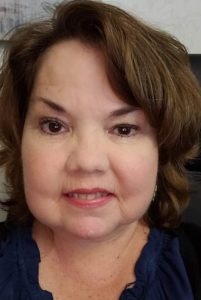
Wilson found her passion for working with children and families while doing her student teaching as an education student at UT. Wilson feels fortunate that after college she found work at one of the largest non-profits in the state, Neighborhood Centers Inc. in Houston (now known as Baker-Ripley). That is where she got her first job with Head Start, and she has been with Head Start ever since.
After Houston, Wilson spent a few years up north as director of a program in Michigan, then moved back to Temple, Texas, to be closer to family and to enjoy some warmer weather. She came to us from Temple. She started the position at the EOAC Head Start in May. “Oh my goodness!” She says when asked about starting a new job in the midst of a pandemic. “It has been quite overwhelming, but we are making plans to make it work!”
Dealing with Covid has taken up quite a bit of Wilson’s time since starting. The health and safety of the children and staff are her first priority. She has also been taking time to get to know everyone, and to get to know the community and the local program.
What is Head Start?
For those who may not be familiar with Head Start, it is a federally funded school readiness program that began in 1964. It is administered by the Administration for Children and Families (ACF) in the Department of Health and Human Services (DHHS) and the Office of Head Start (OHS).
The goal of Head Start, from the beginning as it still is today, is to break the cycle of poverty by helping to close the achievement gap between children who grow up in homes with very little income and those who grow up with more resources. Head Start is now in all 50 states and Puerto Rico.
Head Start is actually two programs: “Early Head Start” which serves children 0-3 years old and their families, and “Head Start” which serves children 3-5 years old and their families. The two programs are collectively known as “Head Start.” Head Start specifically serves low income families. There is no cost to the families who participate. Head Start for McLennan and Falls Counties has been managed by the Economic Opportunities Advancement Corporation (EOAC) in Waco for many years. Early Head Start is typically a year-round program and Head Start typically follows the 10-month school calendar of the local public school system.
What everyone should know about Head Start
What are three things Wilson wishes everyone knew about Head Start?
- Head Start works. It does help to reduce the achievement gap. It is also very empowering to families. “We have several parents who are now on staff,” Wilson says. “They started making goals when their children joined Head Start, and now they have completed their education and come back to teach.”
- Our teachers are well trained educators. Some of our teachers have an associate degree with a child development credential. Many have bachelor’s degrees, and some have their master’s degrees.
- Head Start is not simply “day care” or “watching kids.” It is an educational program that works to develop the whole child and to empower parents.
The Head Start approach is positive, individualized learning for the whole child. Head Start educators develop learning plans to suit each child’s individual needs. Those plans include social and emotional learning and information about health along with language, literacy, and numeracy.
Health is a particular emphasis. Children in Head Start get health and developmental screenings throughout the year and referrals to the appropriate resource if they are at risk. They get nutritious meals including breakfast, lunch, and a snack. They learn about how to develop good health habits. For example, they learn about brushing their teeth and practice brushing their teeth after meals at Head Start.
Head Start also focuses on family well-being. Families who participate in Head Start have the option of working with a Child & Family Advocate. These advocates meet with parents and families and help them set goals. The advocate then helps the family connect to resources in the community that can help them meet their goals. Goals might include things like obtaining stable housing, completing a GED, learning English as a second language, or developing job skills.
Head Start in McLennan County
There are 11 Head Start locations in McLennan County. Some have both Early Head Start and Head Start, and some have one or the other. All in all, they serve 112 children in Early Head Start and 823 in Head Start.
There are three Head Start program options: Collaborations, Center-based, and Home-based.
Collaborations are partnerships with local educational institutions. EOAC Head Start has eight classrooms that are collaborations, two with Waco Charter School (another project of EOAC), two with Harmony Science Academy, and four with Waco ISD. “We love to collaborate so that we are maximizing resources,” says Wilson. “At the collaboration locations the children are dual enrolled in the Head Start program and the program at the location. We have teachers working together from both programs. Our Head Start teachers co-teach with the Waco ISD teachers in the same classroom, for example.”
The rest of the classrooms are center-based programs. They are housed in stand-alone locations throughout Waco, Marlin, Mart, Moody, and one on TSTC campus through December 2020.
Another option that works well for some families, is the home-based program. In this program, visiting educators (home visitors) come to the participating student’s home once a week and provide coaching and lesson plans to the parents/guardians. The visiting educators help the family work with what they have around the home to educate the child. Twice a month the families in the home-based program get together for a group activity. Currently there are 12 Early Head Start and 24 Head Start slots in the home-based program.
What does the new school year look like for Head Start?
Since Head Start follows the local school district calendar, the new Head Start year has been pushed back to September 8 to match the new Waco ISD School year. Also, just like in WISD, Head Start parents will have the option of virtual or in person instruction. Virtual instruction will build on the skills learned during their 2020 summer school program. The summer school program served about 60 4-year-old children. They provided each child with a tablet (Ignite by Hatch) to use in their home. They trained parents on how to use Zoom and then provided the children with individual instruction via Zoom two times per week with small group instruction with their peers via Zoom on a third day.
There will be some scheduling changes this fall due to Covid. At the center-based programs Head Start would normally have all children five days a week. Instead, to transition children and teachers back to school during September, there will be two groups to allow social distancing. One group will come on Mondays and Tuesdays and the other group will come on Thursdays and Fridays. That will leave Wednesday for cleaning and planning. If all goes well, they hope to be able to expand the days in October and for the rest of the year.
Normally, the hours at the centers would be 7-4:00 for working parents and 8-2:30 for parents who are not working. Due to Covid, and to help with the transition back to school, the hours for everyone will be 7:30 to 12:30 for now. The program will evaluate whether or not to expand days and hours on a site by site and week by week basis.
Collaboration classrooms will follow the same schedule as the collaborating institution.
What does the Future hold for Head Start?
Thanks to Covid, Wilson hasn’t had as much time to think about the future at this point as she would have liked. But she does have a few ideas percolating. She would like to form partnerships as much as possible, both with educational institutions and with other service providers in the community. She doesn’t want to duplicate services. Instead she wants to ensure families are referred to resources available in the community.
Wilson wants to be very responsive to community needs. She plans to update the Head Start community assessment soon. Depending on what they find out from the assessment, she might consider a teen parent program or more support for homeless families or children in foster care. She wants EOAC Head Start to be a program that staff and the community are proud to work at and to call their own.
How to enroll in Head Start
Head Start enrolls year-round. There are several spots open now. To apply you can go to eoacwaco.org. From there, click on “Head Start” in the menu at the top of the page. Then click on Head Start Parent Portal. Create a Username and Password and enter your information.
You can also apply in person by completing a form at any Head Start location.
If you have questions call 254-753-0331. To speak to Susanne Wilson directly, the extension is 1800.

This Act Locally Waco blog post is by Ashley Bean Thornton, she has lived in Waco almost 20 years now. Far longer than she ever lived anywhere else. She is retired from Baylor works part time helping to organize after school programs for Transformation Waco. She likes to walk. If you see her out walking, honk and wave and say, “Hi!”
The Act Locally Waco blog publishes posts with a connection to these aspirations for Waco. If you are interested in writing for the Act Locally Waco Blog, please email [email protected] for more information.
By Wendy Cox
When my family lived in another country and found ourselves suddenly functioning in a language and culture unknown to us, daily activities formerly done with unconscious ease became laborious, requiring more cognitive effort than I could have imagined would ever be reasonable. We relied on the patience, kindness, and practical help of friends. Through them, the burdens became bearable, even joyful, as our initial dependence created conditions in which mutually beneficial relationships were strengthened over time.
Since March, COVID-19 has put us in a similar circumstance. Risk-benefit decisions about daily life, formerly made unconsciously, suddenly came to dominate my waking (and sometimes sleeping) hours. I had to think through each one in light of the viral news of the day.
Should I risk another grocery trip in hopes of finding toilet paper?
Should I let my teens have a picnic with friends?
Should we or shouldn’t we visit my in-laws?
And the more sobering decisions —
How do we do family funerals?
How do we care for loved ones who are in the hospital?
And now administrators, teachers, families, and children are facing all manner of risk-benefit decisions as the fall semester approaches.
Whether you are directly involved in back-to-school decisions or not, every one of us has a stake in how this effort goes. That’s the nature of coronavirus. It spreads through the community, between people with and without symptoms, to people with low risk of illness and death and those who are at great risk.
These categories are not always apparent to us, and we likely won’t be able to “see” the outcome of our actions. We know that children can have COVID-19, that some develop symptoms, and that a few cases can be severe. We don’t yet know how infectious children are to others, but we do understand that community-wide prevalence influences case counts within schools and vice versa.
Alongside all of us who care about schools and teachers and students, it is imperative that you join our entire community in acting on what research has taught us about suppressing the spread of coronavirus. In addition to wearing masks, practicing good hygiene, and staying safely distanced, I propose we go a step further and find creative ways that lie within our skills and resources to make it easier for everyone to follow through with safety guidelines. Here are some ideas to consider:
Masks — Masks decrease viral spread making them beneficial to the wearer and everyone else. The more mask-wearers in the room, the safer everyone is. Deciding to wear a cloth face covering is the baseline. Some people want to choose the very best material (see Best Household Materials for a Mask, scroll down on page), but within reason, the best mask is the one people can tolerate wearing when they need to. Be patient with children (or yourself!) until you find the right one.
If you wear glasses, you know how they tend to get foggy while wearing a mask. Share this and other ideas to help reduce the fog and make mask-wearing more pleasant (How to Prevent Glasses from Fogging Up While Wearing a Mask).
Expect children to soil, lose, and forget masks during the school day. Could you volunteer to keep a laundered stash of cloth masks available in your child’s classroom? Recently, I encountered a friend and her soon-to-be kindergartener shopping for treats so her daughter could practice wearing a mask. How kind. We can all practice modeling such a generous attitude toward mask-wearing (and it does take practice!)
Outdoor Activities — Being outdoors is considered to be safer than being indoors. Is there anything you can do to make this idea appealing to your child’s teachers? Maybe you have time to volunteer as an aide to help keep children on task. Maybe you don’t have time, but you have money. Consider purchasing a class set of outdoor chairs (Folding Chair, Portable Lap Desk). Maybe you have skills. Could you volunteer time to help schools create shade structures or plant trees?
These suggestions are obviously incomplete, but they encourage a way of thinking that considers communal efforts and outcomes along with our more individual concerns. With a community mindset, we may find joy and stronger relational ties along the way. I could use more of both in my life right now.
I promise to act in ways that protect you and your family members’ health, even though we might never meet. Will you do the same for me?
Know that we are connected
in ways that are terrifying and beautiful.
(You could hardly deny it now.)
Know that our lives
are in one another’s hands.
(Surely, that has come clear.)
from Lynn Ungar’s poem “Pandemic”
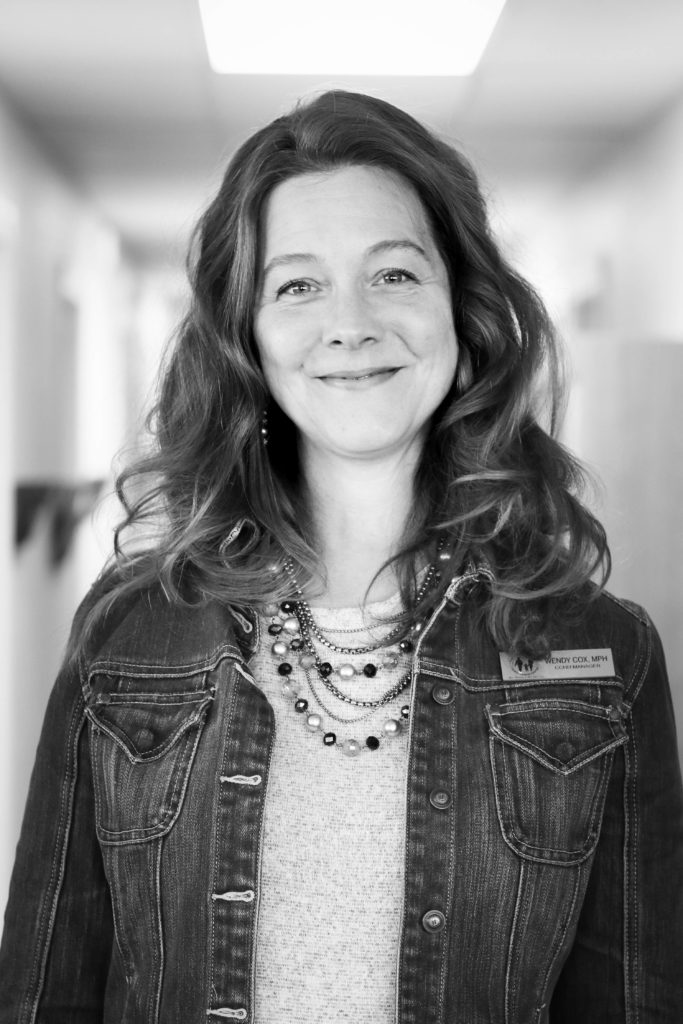
Wendy Cox is a long-time educator who followed her interests into the public health field. She is proud to work alongside colleagues at the Family Health Center in the area of community health engagement. In her spare time, she loves to enjoy time in nature, take long walks with family and friends, and experiment in the kitchen with whatever seasonal foods she’s found at the Waco Downtown Farmers Market.
The Act Locally Waco blog publishes posts with a connection to these aspirations for Waco. If you are interested in writing for the Act Locally Waco Blog, please email [email protected]for more information.
NEWS RELEASE
Transformation Waco has selected Isaac C. Carrier as the next principal of G.W. Carver Middle School. Dr. Carrier is a career educator with over 25 years of experience as a teacher, high school assistant principal, middle school principal, central office administrator, and educational consultant.
“I am both honored and blessed to have the opportunity to lead G.W. Carver Middle School as its next principal,” Carrier said. “I will put forth my best effort to ensure the success of the students and staff of the school and will be of the greatest service and support of the community we serve. Great things are ahead as we ‘Commit to Panther Excellence.’”
While serving as principal in Aldine ISD, Carrier led his school to earn numerous awards and the state’s highest accountability ratings. In his role as executive director in Dallas ISD, he was instrumental in receiving national awards, and he also supervised four schools that ranked in the top 100 high schools in the nation.
Carrier earned his bachelor’s degree in agriculture and his master’s degree in educational leadership from Stephen F. Austin State University; in 2017, he graduated from Texas A&M University with a Ph.D. in curriculum and instruction with an emphasis on urban schools. Most recently, he co-authored “The Disestablishment of African American Male Compliant Ambiguity: A Prison Pipeline Essay” in the journal Intersections: Critical Issues in Education.
“We are delighted to bring Dr. Carrier onboard,” Transformation Waco Chief Executive Officer Dr. Robin McDurham said. “His wealth of experience as an educational leader will serve the students and staff at Carver well. He has devoted his career to ensuring that every child is provided equitable learning opportunities and access to a high-quality education.”
Carrier will begin his tenure on July 1. He is taking over the leadership role at Carver from Phillip Perry, who tragically passed away in March from complications of COVID-19.
By Jennifer Branch
Talent. It is the top need of employers across the country. Texas and Waco are no exceptions, especially with historically low unemployment rates.
As the “baby boomer” generation continues to age and exit the workforce, employers are becoming more and more desperate for adequately trained workers. The growth of a competitive economy and rapid advances in technology have changed the face of the job market and we as a community must answer.
The Heart of Texas P-20 Council is a school-to-work initiative that builds pathways from education to workplace to provide a skilled workforce. Our mission is to create collaborative partnerships that connect students to both college and career readiness. The council has historically had a strong presence of collaboration from educators, but the missing link remained – industry feedback.
My work with the Greater Waco Chamber of Commerce has been incredible. I have the pleasure of sitting down face-to-face with local employers throughout McLennan County and learning more about their businesses and the dreams and passions that led them to their line of work. I am often invited to celebrate successes, but I am also challenged with partnering with businesses to overcome issues they are facing. Ninety-five percent of the time, the greatest challenge our local businesses face is recruiting and maintaining Talent and Workforce. They often face growth restraints due to the lack of qualified workers. Markets are hot, products and services are in demand, but businesses simply cannot accommodate all requests because they do not have capacity. If they had the qualified, trained employees they need, they could more closely meet the demands.
The feedback from my visits is aggregated and collectively shared with educators, curriculum planners and community leaders. Allowing the first-hand transfer of information about the specific skills and needs the employers are looking for has helped the P-20 Council’s overall local mission and commitment as well as supported the state’s 60×30 strategic plan for preparing students for the workforce. The newly launched Talent Portal www.WacoTXJobs.com and the ongoing, strategic relationship with the US Army’s Fort Hood Soldier for Life Transition Assistance Program are other examples of workforce initiatives I focus on as well as continuing to support our local industry and community partners.
One thing that I have seen that is most encouraging and fascinates other economic developers is the collaborations within our community. Waco has brought to the table City and County officials, regional early-ed public and private schools, leaders from TSTC, Baylor University, McLennan Community College, Texas Tech University at Waco, Tarleton State University – Waco, Workforce Development Boards and other community and industry leaders, literally all focused on the same end goal.
While change certainly is underway in our community to develop a robust talent pipeline for employers and to give job seekers more and clearer options and career pathways, we must continue to collaborate and push for continued change. A healthy economy and job market lead to healthy communities, which lead to healthy businesses and healthy families. The bottom line is that there is no growth without talent. Partnerships that nurture, grow and diversify the talent pipeline are vital and partners in McLennan County should be proud of the work started.

Jennifer Branch serves as the Director of Existing Industries and Workforce Development on the Economic Development Team at the Greater Waco Chamber. She is also on the Workforce Development Board as the Co-Chair for the Texas Economic Development Council. She relocated from Dallas to Waco 10 years ago and is settled in China Spring with her two daughters. In her “free” time she enjoys all things outdoors, especially on the lake or one of the rivers flowing through our city center. Along with being an ambassador for our community, she is also an active advocate for many non-profits for which she has a passion.
The Act Locally Waco blog publishes posts with a connection to these aspirations for Waco. If you are interested in writing for the Act Locally Waco Blog, please email [email protected] for more information.
By Kristi Pereira
I love collaborating. I love being in a room of colleagues and fellow community members, discussing projects and plans, and exploring ways in which we can work together to achieve a common goal. And I especially love this if that common goal is something that has the potential to create an improved quality of life in our beloved Waco. There is very little that is as satisfying to me professionally as when individuals come together to create something meaningful that benefits our community as a whole.
I have had the privilege of working for and with several non-profits within our community, and I now serve as the Coordinator of Community Programs in McLennan Community College’s Continuing Education Department. Over the past several years, I have enjoyed a great deal of partnering, networking, and you guessed it….collaborating. The projects and plans that I have witnessed come together the most successfully can be attributed to each person’s commitment to diligently working together in order to see the task through to the end. I am incredibly grateful to work in a position where I get to witness this very thing on nearly a daily basis. Our Continuing Education mission statement specifically states that we are “deeply committed to the advancement and enrichment of Waco and McLennan County through our collaborations to offer the best learning experiences possible.” We accomplish this in a number of ways, and like links in a chain, we cannot optimally function without every piece coming together.
It starts with our students. Our community has supported our mission to provide lifelong learning for more than 50 years! This long-term dedication has allowed our programs to grow and flourish, all while bringing people together from all walks of life to learn new skills and hobbies. From the children who attend Kids College, to the adults who prioritize lifelong learning, we would not exist without each student’s desire to expand their knowledge through our courses.
Furthermore, we would not function without our incredible team of instructors. Our instructors plan, prepare, and execute courses that meet a wide variety of needs within our community. They come to us excited to share their knowledge and experiences, and we are grateful for their influence. Even during my short time at MCC, I have heard stories of individuals gaining skills that helped them land their dream job, or others turning what was initially a hobby into a thriving career.
Another important link in the collaboration chain are our community partners. In recent years we have established partnerships with a number of local businesses and organization who have helped us expand and promote our course offerings. These partners have opened the doors of their businesses to help us reach an even broader audience, as well as provide new and unique learning opportunities to members of the Waco community.
I am proud to work for an institution that encourages partnership, and also to live in a city that embraces interconnection. We like to say in the Continuing Education Department that “Life is Good in Waco” (we print this very phrase on all of our publications!) And it is true! And life will continue to be good in Waco every time we choose to link together, creating an unbreakable chain of community collaboration.
Here’s the link to see what MCC Continuing Education has to offer: http://www.mclennan.edu/continuing-education/

Kristi Pereira is the Coordinator of Community Programs at McLennan Community College, through the Continuing Education Department. Originally from the Pineywoods of East Texas, she has called Waco home for almost 12 years. Kristi enjoys all things fitness and nutrition, reading, volunteering, and a good cup of coffee. She has been married to her husband Hermann, for almost 15 years, and they have two kids, Hudson and Ruby.
The Act Locally Waco blog publishes posts with a connection to these aspirations for Waco. If you are interested in writing for the Act Locally Waco Blog, please email [email protected] for more information.
By Clay Springer
Last May, three local entrepreneurs came to me with a challenge. They had purchased a 14- passenger bicycle car six months earlier and launched “Waco Pedal Tours” (WPT), a startup providing entertainment tours in Waco’s downtown.
Cory Dickman, Jake Cockerill, and Danny Abarca are true entrepreneurs, ready to bet it all in the belief that their product, a pedal car, could play a vital role in shaping the downtown experience for locals and guests alike. But, by the time they came to me, they were emotionally drained. It turns out the pedal car they had purchased was a hodge-podge of mis-matched imperial and metric parts that the previous owners had thrown together with a working philosophy of “get the next tour finished and worry about the rest later.”
Keeping this Frankenstein pedal car running was a nightmare. They had spent countless hours doing cross-country searches and talking to engineers and designers and still they had no solid replacement parts. I signed on to help with the project, and we spent additional countless hours researching, brainstorming, designing, and working with the best old-school machinist in Waco until we finally had the pedal car back on the road.
Even after my involvement with WPT, however, problems with the old pedal car were a constant problem: holes in watered batteries, cracked brake drums, split axle shafts, electrical shorts, etc. The original pedal car was built in China and then shipped to America for final assembly. Most problems related to a metric or Chinese version of something not being compatible with what was readily available for purchase in Waco, Texas.
We realized it was time to build from the ground up. We wanted a frame that could be repaired with parts from local stores or junkyards in 24 hours or less. We wanted a better suspension for a more comfortable ride on bumpy roads. We spent hours scheming possible new additions to the bike: water misters for hot days, on board hot chocolate tap for winter, karaoke, massive sound system, air-ride suspension for comfort, Mario Kart (a personal favorite and I still remain the 9-time undefeated champ at the annual RAPS Mario Kart races!), and so much more.
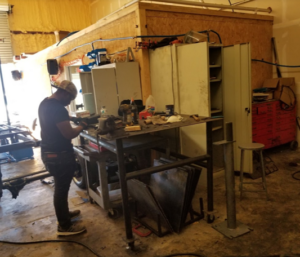
We had lots of ideas for improvement based on customer comments… added space between pedals and bar for folks with long legs, a space to lock up personal items or coolers, a step with a handle for loading and unloading, and an extra seat or two. We wanted a technical service manual and a troubleshooting guide.
Of course, all of this conversation about new features and improvements led to some dreaming about scaling the product up into multiple pedal cars and serving as a vendor for other entertainment startups.
Cory, Jake and Danny knew we could build a better pedal car, but the crossroads of time and money spent to get the original bike on the road again had taken its toll. As we dreamed up design ideas and worked through trade-offs we kept up a running cost analysis on building a new pedal car. How could they afford it? Who would build it?
The pedal car project fascinated me. I was drawn to the problem-solving challenge of working on a vehicle that seems simple from the curb but is oddly sophisticated below. I began to wonder if this was a job that my students at Rapoport Academy Public School (RAPS) could do.
For over a decade the RAPS robotics team has competed every year in the FIRST Robotics Competition (FRC). This competition focuses on technical skills like DC electronics, CAD, CAM, CNC machining, pneumatics, LEDs, fasteners, gears and pulleys. One problem we have always faced while competing in FRC is the time commitment. Our students have to balance their time between wage earning jobs and after school activities like robotics.
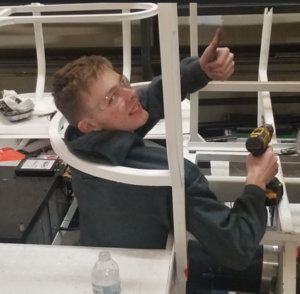
Just like that, the idea was born: bring students on at WPT as full W-4 employees! The students could earn OSHA certification and be covered under workers comp insurance. This would help students balance having a job to earn an hourly income and earning class credit. Unlike in a regular robotics project, in this build we wouldn’t have to fundraise the cost of the materials, so we could spend more time teaching fabrication techniques and safety.
We formed a team – four RAPS high school students, three partners from WPT, and one teacher (me!) – we were in it not just to build a product, but to build a company.
It is almost impossible to list all the good outcomes and highlight moments that have come from this project: The close personal interactions between the students and owners; the opportunity to learn project management, marketing, finances / loan structure; the opportunity to connect STEAM (Science, Technology, Engineering, Art, and Math) learning from the classroom to real experience in the field. Students were pressed to quickly learn how to read, interpret and fabricate blueprint drafts. They learned how to communicate within a team to get a project up and running.
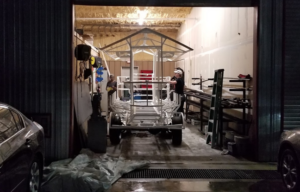
The brightest highlight by far has been the four high school students themselves. Each student brought a unique skill set and personality to the team. I have known these students since they were in the 5th and 6th grades and it was an incredible experience to go from being a teacher in front of a class to working alongside them on a daily basis. We worked through conflict together. We got in trouble with management for playing music too loud together. We spent time talking about cars, college, and life… but most of all we learned together.
In the beginning this project was about welding some tubes together, throwing axles and brakes under it, adding a little paint, installing a stereo, and sending a pedal car down the road. It soon transformed into a project about high school students developing the skills to be successful in college, career, and life.
Yes, you have to know how to align gears, and calculate weight-to-gear ratios to build a pedal car, but those are skills we can teach in a classroom. You cannot teach the rush you feel when you meet a high-stakes deadline, or the satisfaction that comes with successfully managing a project that relies on three different people with six different parts progressing at once, or the attention required to improve a design by listening to customers. You have to experience these things. I have learned many, many things through this work-based learning partnership, but one of the most impactful things I will take from it is, “You cannot simulate authentic real-world learning.”
After two weeks of rigorous testing over spring break we will fix and fine tune any problems that arise with the new pedal car. Then we will bring on another set of talented students to help write the technical guides that will accompany the pedal car, to use RAPS drones and cameras to video and photograph the pedal car for marketing packages and social media posts, and to serve as drivers for tours.
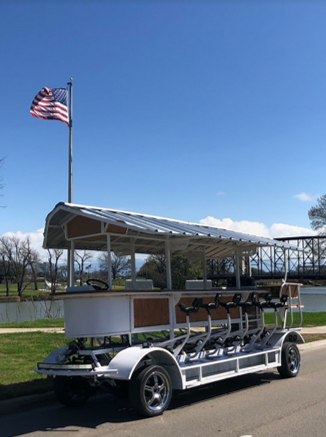
This new pedal car is a prototype, created from our imagination. It is full of imperfections with improvements to be made, but I guarantee you this: our RAPS team is up for the challenge and we are just getting started. So, go take a ride on the new pedal car, your dollars will support local education and you might just have one of the builders from our team as your driver!
Waco Pedal Tours and Rapoport Academy Public School entered into a formal partnership to promote Entrepreneurship and STEAM education together. From trade and technical disciplines to entrepreneurial finance and marketing, local companies like Waco Pedal Tours are the key to the success of our next generation. I applaud WPT for taking a risk on a couple of knuckleheads with power tools (me included).
Rapoport Academy focuses on entrepreneurship in STEAM disciplines. We are looking to partner with more companies to meet the interests of every student. I would personally love to connect you with some amazing young talent to help grow your idea or established business.
How could your business and our students mutually benefit from the tools, training and facilities that RAPS has to offer? How can we create some authentic student learning experiences together? There is a little something for every passion in entrepreneurship and it takes every person pedaling for the bike to move forward.
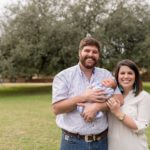
Clay Springer currently serves as STEAM and Career and Technical Education Director for Rapoport Academy Public School. Clay started his educational career at Rapoport Academy in 2010 as a teaching assistant for Quinn Middle school before becoming a classroom teacher and advocate for STEM and Authentic education. Clay and his wife, Joi, welcomed their first child, Shepherd, on Thanksgiving day 2018. They enjoy spending time on the Brazos River on old boats that Clay boldly claims someday will be as good as new.
The Act Locally Waco blog publishes posts with a connection to these aspirations for Waco. If you are interested in writing for the Act Locally Waco Blog, please email a[email protected]for more information.
By Elizabeth Brownlee
Figuring out what you want to do with your life is difficult for a 30-year-old adult, so you can imagine teenagers have a tough time with it.
House Bill 5, passed in 2013, increased the pressure for our students to plan for their future careers at an earlier age. All ninth graders are now required to select one of the following endorsements:
- Arts and Humanities Endorsement
- Business and Industry Endorsement
- Multidisciplinary Endorsement
- Public Service Endorsement
- STEM Endorsement
An “endorsement” is a series of courses that are grouped together to support a particular career path. To implement this requirement successfully, schools have had to expand career exploration opportunities for students, and also start the career exploration process sooner.
At Connally ISD, one of the major ways we help our students find their future career path is through the Connally Career Tech Early College High School. Our campus is completely focused on students working towards their chosen future careers. We help them get started on their career path and get experience in their chosen fields before they graduate. As the counselor of Connally Career Tech I spend a lot of time with students trying to help them create plans not only for high school, but for their futures once they graduate. It may seem unrealistic to ask a fifteen-year-olds to plan out their future career paths and expect them to stick to it, and maybe it is, but getting them to start thinking and talking about a path is important.
For me helping a student choose a career path is all about building a relationship. I know in education we constantly talk about test scores and grades, but when it comes to being a counselor, you have to build relationships with your students. Getting to know my students and their interests helps me guide them along their career exploration path. I am constantly trying to get to know my students. I try to see them in their element, whether it’s while they’re in study hall, in the classroom, or just talking to their friends. I talk to parents about their student’s interests. Parents have insights into their student’s likes and dislikes that I may not see.
My relationship with a student is my most important tool for helping them. I need to know what’s important to them. Without the relationship, I wouldn’t be able to have those important, hard, honest conversations when their goals and their interests don’t seem to match.
Sometimes a student will want to study for a particular career path because an older sibling really likes it, when in reality he/she has no interest in that career. He/she is just unsure of what to do in the future. I never try to force a student in a certain direction. I give them an idea and tools to help them research it to see if it’s something they are truly interested in pursuing. If possible, I have them speak with someone in the field or someone teaching in that field.
I find a lot of students want to go into a career field because that’s all they’ve been exposed to growing up. We’ve all heard of doctors, lawyers, police officers, teachers, and similar careers. We see them all the time and they are all great career choices, but they don’t fit all students.
Each year when we have our College and Career Fair or our Recruitment Night for Connally Career Tech, I bring my students to speak to specific tables or programs that I know fit with what they want to do in the future. By encouraging a student talk to someone from a field they don’t automatically think about, I help them get exposure to new choices. While I want them to go and talk to every program or table that interests them, I want to make sure I help them see what they wouldn’t normally choose.
We also try to take our students on field trips that cover multiple career fields. This helps expose our students to different careers they may not think of right away. It is my goal to help my students find out about the lesser known, sometimes behind the scenes careers they don’t always know about. Many times I get to go with them and observe their reactions. This helps me guide them in their career choices. Students will come back from a field trip and begin to have conversations about what they saw, what they liked or didn’t like. Then we start moving forward with career planning based on what they tell me.
My students and I spend a lot of time talking about their career goals for the future and how their high school choices are helping them get to that career. Sometimes a student settles on a career choice, but then they get to experience a little bit of it. They may come and tell me that it’s not what they thought, or they didn’t realize everything that went into that career and they want to change. That is probably one of the best parts of our program. Students get to experience at least a little of what a particular career is like before they graduate from high school. They don’t have to wait until after high school and waste money and time working towards a career that they end up not enjoying. I want them to be able to make well informed decisions about their future career. For many students, the experiences we provide help them do that. I’ve seen too many students graduate from high school unsure of their future. I make it one of my goals to help my students have a plan or a vision for their career path before they graduate.

Elizabeth Brownlee is in her 4th year as the Connally Career Tech Early College High School Counselor and her 10th year in education. She has been married for just under a year. She and her husband have two pit bulls and chihuahua. In her free time, she enjoys crafting, running, and anything outdoors.
The Act Locally Waco blog publishes posts with a connection to these aspirations for Waco. If you are interested in writing for the Act Locally Waco Blog, please email [email protected] for more information.
By Hermann Pereira
Being an educator is one of the most rewarding and difficult careers around. We constantly invest our time and effort into the next generation and the school year feels like a marathon. So by the time the summer hits we just want to prop our feet up. But educators are some of the most dedicated professionals around so we spend our summers attending professional development sessions in order to improve at our craft.
This past summer teachers at Connally ISD had the unique opportunity to participate in a teacher externship program through a grant that we were awarded through the University of Texas STEM Center. The goal of the externship was to interact directly with science, technology, engineering, and mathematics (STEM) industry leaders and learn about industry trends, needs, and opportunities that they can bring back to the classroom to enhance instruction and ultimately, student learning and achievement. We had 19 teachers from a variety of teaching fields who engaged with industry partners here in Waco. In this blog we will highlight 3 of our teachers and what their takeaways were from the program:
Liesel Wilson – Spanish/AVID
 The recent Tex2 summer externship that I was a part of was truly an eye-opening experience! As a classroom teacher for 25 years, I have plenty of educational experience, but not a lot of encounters with the business world. This opportunity to spend time with various local businesses and learn first-hand how teachers could better prepare future candidates for the job world was an invaluable lesson.
The recent Tex2 summer externship that I was a part of was truly an eye-opening experience! As a classroom teacher for 25 years, I have plenty of educational experience, but not a lot of encounters with the business world. This opportunity to spend time with various local businesses and learn first-hand how teachers could better prepare future candidates for the job world was an invaluable lesson.
I was able to visit HOLT CAT Machines and Engines, KWTX TV, Central Texas Iron Works, Vossloh, the Lacy Lakeview Police Department, and a robotics class at TSTC. At each location, the overwhelming response to what our students were lacking was the basic knowledge of soft skills. Applicants need to be aware of proper interview dress, use of cell phones (or lack thereof), the importance of eye contact, and a firm handshake. This take away was something that I was easily able to implement daily both inside and outside the classroom. Upon entering, all students must shake my hand and look me in the eye while saying “Good morning”, or “Nice to see you”. It was important for me to first teach my classes HOW to shake hands and the implicit value of body language and eye contact. After MUCH practice, this has become second nature to my students. I use myself as an example of the NO cell phone policy that many workplaces enforce. Students are not permitted to text during class time, so I also follow this rule. Leading by example shows students that I value the rules and understand why they are in place.
All in all, the externship was a tremendous experience. I am happy to say that the takeaways were relevant and definitely worth spending time on to ensure that students will be ready to face the world of work after graduation!
Liesel Wilson has been in education for twenty-four years. She currently teaches Spanish 2 and is one of the AVID elective teachers at Connally High School. In her free time, she loves to read, trail run, and have amazing travel experiences with her children Joslyn and Savanna.
Julia Jirovsky – Debate Coach
 As a communication teacher, the opportunity to speak with employers around Waco in the TEX2 externship was tremendously valuable. Speaking with Express Employment Solutions highlighted a need for students to leave high school with an understanding of professional documents such as résumés and cover letters. Specifically, students can give themselves an edge in the job market by submitting résumés that are not adapted from popular web templates. In addition, touring manufacturing operations such as Englander dZignPak and Vossloh taught me that many of the most successful employees, regardless of education level, are ones that show up on time, ask questions, and take initiative in the workplace. It was validating to learn that the skills Waco’s job market craves are ones that we teachers can reinforce every day in every content area. We can hold our students to high standards, require attendance and timeliness, knowing that these soft skills will propel our students to success after graduation.
As a communication teacher, the opportunity to speak with employers around Waco in the TEX2 externship was tremendously valuable. Speaking with Express Employment Solutions highlighted a need for students to leave high school with an understanding of professional documents such as résumés and cover letters. Specifically, students can give themselves an edge in the job market by submitting résumés that are not adapted from popular web templates. In addition, touring manufacturing operations such as Englander dZignPak and Vossloh taught me that many of the most successful employees, regardless of education level, are ones that show up on time, ask questions, and take initiative in the workplace. It was validating to learn that the skills Waco’s job market craves are ones that we teachers can reinforce every day in every content area. We can hold our students to high standards, require attendance and timeliness, knowing that these soft skills will propel our students to success after graduation.
Julia Jirovsky is a second year teacher and debate coach. She is a graduate of the University of Texas at Austin and currently teaches Debate, Professional Communication, and Principles of Education and Training. In her free time, Julia enjoys judging debate, crafting, and going to metal concerts.
Miranda Flanary – Business
 As a business education teacher with prior work experience, it is important to take advantage of ways to refresh and renew my knowledge what is happening in today’s workplaces. The externship offered this invaluable opportunity as I was able to gain insight at a variety of local employers, including KWTX Channel 10, DeuxSouth Creative, Caterpillar, Sherwin Williams, and the City of Waco. These businesses each demand very different levels of education and work experience amongst their employees. However, there was a consistent message when it came to transferable skills: these are the foundation on which any successful employee is built. Dependability, reliability, willingness to learn, and communication skills are essential, regardless of the hard or technical skills needed for a job. This information allows me to reference real-world expectations at real-world employers, beyond my own work experience, to drive home how students need to be prepared for the next stages in life.
As a business education teacher with prior work experience, it is important to take advantage of ways to refresh and renew my knowledge what is happening in today’s workplaces. The externship offered this invaluable opportunity as I was able to gain insight at a variety of local employers, including KWTX Channel 10, DeuxSouth Creative, Caterpillar, Sherwin Williams, and the City of Waco. These businesses each demand very different levels of education and work experience amongst their employees. However, there was a consistent message when it came to transferable skills: these are the foundation on which any successful employee is built. Dependability, reliability, willingness to learn, and communication skills are essential, regardless of the hard or technical skills needed for a job. This information allows me to reference real-world expectations at real-world employers, beyond my own work experience, to drive home how students need to be prepared for the next stages in life.
Miranda Flanary is a native Wacoan and has been in education for five years, following careers in financial services and human resources. She currently teaches Principles of Business, Marketing, and Finance; Entrepreneurship; and General Employability Skills and is the CTE department head. In her free time, Miranda enjoys live music, traveling, trivia, and spending time reading and drawing with her 8 year old son Regan.
Opportunities like this need to continue because the beneficiaries of these programs are the students of our community. When public educators, the business community, and higher education entities come together the possibilities are endless.
Connally would like to thank all of our partners that made this experience so meaningful. We look forward to connecting with them and others this next summer:

 Hermann Pereira is the Principal of Connally Career Tech Early College High School and AVID Coordinator and has been in education for 12 years. He is a Houstonian who roots for all Houston sports teams, but has called Waco home for the past decade. He has been married to his wife Kristi for 14 and a half years and has two children, Hudson who is 10 years old and Ruby who is 7 years old.
Hermann Pereira is the Principal of Connally Career Tech Early College High School and AVID Coordinator and has been in education for 12 years. He is a Houstonian who roots for all Houston sports teams, but has called Waco home for the past decade. He has been married to his wife Kristi for 14 and a half years and has two children, Hudson who is 10 years old and Ruby who is 7 years old.
According to the Prosper Waco website, one of our goals in the community of Waco is to “Increase youth employment.” In my job as Workforce Coordinator at Communities In Schools (CIS) that goal is in the front of my mind every day. When asked about writing a success story about our Workforce program, it was hard for me to pick! There are countless successful youth that I could highlight in an article. I could point to many of our clients who have challenged themselves to overcome their barriers and have worked tirelessly to be victorious in education and employment. For example, the young person I will profile in this post balanced a multitude of responsibilities and has been extremely successful in her educational and employment journey.
 Selena Hernandez originally started in the Communities in Schools program at La Vega High School. After high school graduation, she was referred to the Workforce Development (WIOA) program as she had a strong interest in obtaining her nursing degree. After attending MCC for her prerequisite courses and meeting the rigorous nursing school requirements, she was accepted into the Registered Nursing Program at MCC. Selena was able to maintain her responsibilities as a mother, keep up her grades and work overnights at Providence Hospital Emergency Room in Patient Registration. While on her journey to become a nurse, Ms. Hernandez ran into some educational challenges but with the help of Communities in Schools and her own self-determination she was able to push through.
Selena Hernandez originally started in the Communities in Schools program at La Vega High School. After high school graduation, she was referred to the Workforce Development (WIOA) program as she had a strong interest in obtaining her nursing degree. After attending MCC for her prerequisite courses and meeting the rigorous nursing school requirements, she was accepted into the Registered Nursing Program at MCC. Selena was able to maintain her responsibilities as a mother, keep up her grades and work overnights at Providence Hospital Emergency Room in Patient Registration. While on her journey to become a nurse, Ms. Hernandez ran into some educational challenges but with the help of Communities in Schools and her own self-determination she was able to push through.
There were many times she would visit the office and have her children with her. They would play and we would work on job readiness activities and talk about her aspirations and struggles. She is the definition of a multi-tasker! Ms. Hernandez received her Licensed Vocational Nurse (LVN) credentials in Summer 2017 and completed the RN Program in December 2017. She dedicated her time to her family and her studies and became a licensed RN in 2018.
Selena is now employed at Quality Care Nursing Facility as a Nurse Supervisor and works PRN (as needed) at the Atrium Nursing Facility as a Registered Nurse.
She was able to attend her classes and clinicals, meanwhile balancing employment and her responsibilities as a wife, mother, and daughter! She is a true rock star. To know Selena is to know an outgoing and compassionate heart. She shows such amazing compassion for her family, patients, and those around her. She has a positive outlook on life and she is certain to make you laugh with her humorous personality. When you look at Selena’s journey you will find that the path to success is paved with dedication, time, and finding a way to move past setbacks. She has taught us that if you have a passion, you should follow it with every twist and turn!
The Workforce Development Program at Communities In Schools provides career coaching to youth ages 16-24, both in and out of school, to assist them in educational attainment and reaching their post-secondary goals. The Workforce Development program provides academic assistance, GED preparation, career exploration, assistance with entry into post-secondary education, and job placement opportunities. For more information, please visit www.cishot.org or email [email protected] today!
The Act Locally Waco blog publishes posts with a connection to these aspirations for Waco. If you are interested in writing for the Act Locally Waco Blog, please email [email protected] for more information.
By Jaja Chen
I often hear individuals make comments about teachers that make it seem as if they have it “well off” because of having summer vacations. While having summer off is a crucial part of teachers’ self-care and work-life balance, we often do not sit and consider the amount of energy, finances, or even time that teachers dedicate throughout the school year – year after year – to managing their classrooms and educating our children daily.
Oftentimes, teachers’ own self-care goes by the wayside because of the immense amount of needs they must tend to in their classrooms, amongst students, and to meet all the tasks and demands they face as a teacher – even outside of the classroom. This can lead to summer being used to “catch up” on sleep, health, and self-care.
While summer can be a huge part of teacher self-care, my hope is that summer is not the ONLY time when teachers are able to take care of themselves.
Here are three ways we as a community can seek to support our teachers in self-care as they return to the new school year:
1.) Honor and encourage our teachers – Coming from a Taiwanese background, educators are highly honored, valued, and esteemed. The culture of honor that East Asian cultures place on teachers is something we can learn from. How can we honor and encourage our teachers throughout the school year? Rather than making comments about how good they have it or how they shouldn’t complain about difficulties on the job due to having summer off, how can we seek to listen to and support our teachers as they deal with ongoing work-life stress?
2.) Support healing from secondary trauma & burnout – Compassion fatigue is a common experience amongst helping professionals and is a combination of secondary trauma and burnout. Secondary trauma occurs when we continually hear about or witness, directly or indirectly, traumatic events that occur to others. Working with students and families daily exposes teachers to traumatic events and can lead to secondary trauma. Burnout, on the other hand, is feelings of ongoing exhaustion and helplessness due to inefficiencies experienced in our jobs. When our teachers experience compassion fatigue, do we judge them or do we seek to understand? Do we point them to resources, such as individual counseling, or do we shame them? As administrators, do we seek to create policies and school cultures that enhance and support teacher self-care? Are we open to our teachers taking time off for their mental health or do we stigmatize mental health recovery?
3.) Volunteer for local school efforts & initiatives – Ensuring that our students and schools are successful and thriving is a community effort. Teachers are not the sole guardians for our children’s mental, emotional, physical health, and educations. We all have a role to play in our communities as we support teachers in their self-care. Part of this is seeing how we can play a role in supporting school initiatives, school events, and to inquire about ways to support schools as volunteers. Recognizing that we have a part to play in supporting our schools helps reduce the burdens placed on teachers to be everything to our children. Ways to be involved include supporting mentoring and tutoring programs that non-profit organizations-including Communities in Schools (CIS) and Prosper Waco – host for local schools. Local churches may also have after-school programs or book clubs to support children such as the STARS Mentoring Program.
The success of our schools requires a community effort.
What are ways you can support your local school today? And if giving of your time and/or finances is not a possibility, are there ways to connect with a fellow teacher and to encourage them as they begin their new school year. My hope is that the task of teacher self-care is seen as a community effort, not just placed on teachers themselves to figure out. There are ways that our culture and perspectives can hinder teachers from thriving in the amazing work they do. Let’s strive for creating a culture of compassion, authenticity, and empathy, as opposed to shame.
 Jaja Chen, LMSW, CDWF is a private practice therapist in Waco through Enrichment Training & Counseling Solutions specializing in trauma, compassion fatigue, maternal mental health, and difficult life transitions. As an EMDR Trained Therapist, Jaja’s passion is walking alongside helping professionals whom are healing from PTSD, depression, anxiety, secondary trauma, and burnout. Jaja can be contacted via email at [email protected] or via webpage at http://enrichmenttcs.com/meet-jaja-chen/
Jaja Chen, LMSW, CDWF is a private practice therapist in Waco through Enrichment Training & Counseling Solutions specializing in trauma, compassion fatigue, maternal mental health, and difficult life transitions. As an EMDR Trained Therapist, Jaja’s passion is walking alongside helping professionals whom are healing from PTSD, depression, anxiety, secondary trauma, and burnout. Jaja can be contacted via email at [email protected] or via webpage at http://enrichmenttcs.com/meet-jaja-chen/
